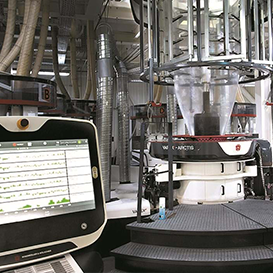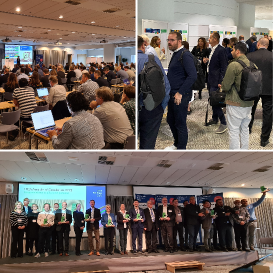
Focus on Spain
Competitiveness through collaboration
The Centre for Technological Development and Innovation (CDTI) in Spain is a public business entity, under the auspices of the Ministry of Science and Innovation. Its goal is to promote innovation and technological development among Spanish companies, channelling requests for help and support to RD&I projects of Spanish companies at both national and international level. Here, Juana Sánchez Pérez of the Technology Cooperation Deputy Directorate explains how the CDTI contributes to improving the technological level of Spanish companies.
“We facilitate this improvement in various ways. Firstly, through technical-economic evaluation and public funding for innovation by way of subsidies or partially reimbursable funding to R&D projects developed by companies. Secondly, through management and promotion of Spanish participation in international technological cooperation programmes long with the promotion of the international transfer of business technology and support services for technological innovation. On top of this, we provide support for the creation and consolidation of technology-based companies.”
Automation as a strategy
The Spanish business landscape is basically made up of small and medium-sized companies and, in particular, of micro-SMEs, companies with less than 10 employees. “The intelligent use of ICT constitutes an effective tool to improve the productivity and competitiveness of companies in a sustainable way, promote their growth and innovation, assist in their international expansion and contribute to the improvement of employment from both a quantitative and qualitative perspective,” Juana explains. “Automation has become a strategic factor in the transformation of the production model and the economic recovery of Spain after the pandemic.”
Committed to ICT
The ICT sector has been one of the fastest growing sectors in Spain over the last decade and has become a mature sector where prestigious companies lead projects in international markets. “Not only does the software sector in Spain reveal a very diverse landscape,” Juana says, “but it is highly segmented with many SMEs struggling to stay in the market in a year that was quite complicated by COVID-19. But our commitment to the ICT sector is important. High connectivity and a qualified workforce in a diverse environment such as the EU make our country a good choice for ICT-based business projects. Consequently, the CDTI grants financial aid and facilitates access to third parties for the implementation of both national and international research and development projects. It also provides support to companies to develop in terms of international cooperation, for which it offers aid to innovation and technology transfer projects, its external network and multilateral cooperation projects, like Eureka and Iberoeka, as well as bilateral relations with Japan, China, South Korea, India, Brazil or Morocco, among others.”
ITEA provides strong support on improving the impact of each project, which is particularly important for us.
Technology boost
According to the large Spanish ICT business associations, the forthcoming regulations and investment will allow the definitive boost of new technologies, such as artificial intelligence, the cloud, cybersecurity, the advancement of quantum computing, 5G connectivity and the digitalisation of SMEs. In terms of digital transformation, the laws and decrees that are due to be approved in Spain will usher a change in business and social fabric in record time. “We see the relevant Spanish business associations coming together in highlighting specific technological trends, and the relevant investment projects that already exist in Spain in the new technologies mentioned earlier.”
Aligned targets
“In the implementation of our internationalisation strategy for Spanish companies, Eureka is the main programme managed and financed by CDTI,” Juana explains. “The Eureka Clusters Programme, in particular, is considered a very interesting option for our companies and it is well known among our communities. It offers the flexibility our companies need and it is aligned with our national priorities. The Eureka Clusters Programme offers, on the one hand, the expert guide from its Board to experienced companies and, on the other hand, the thoughtful and valuable support for those inexperienced companies. ITEA, in particular, offers the additional support to our companies to stimulate the generation of RD&I project proposals where the whole value chain of the industry is involved. ITEA also provides strong support on improving the impact of each project, which is particularly important for us. CDTI is very well aligned with the Eureka Clusters Programme. Both have common goals from the perspective of supporting companies to succeed with their international cooperative project ideas.”
International collaboration is key
Juana champions the role of collaboration in aspects such as open innovation and globalisation. “It is clear that collaboration among all kinds of entities is needed to be competitive in today's market. The Eureka Cluster Programme environment has this collaborative calling and for the companies and research centres that participate, there is a clear cooperative bi-lateral advantage. SMEs are able to take advantage of the tractor effect of the large industries – they provide access to large-scale projects and to global markets. In their turn, large industries benefit from the agility of SMEs to adapt to the continuous changes required from markets demands. Research organisations contribute by giving intelligence and best quality to those projects while companies accelerate the time to market for their project research. So, international projects in which collaboration is pivotal play a key role in the internationalisation strategy in Spain that is geared to improving the competitiveness of Spanish companies in attracting and participating in global markets.”
More information:
https://www.cdti.es

Other chapters
Use the arrows to view more chapters

Editorial
By Jean-François Lavignon

Country Focus: Spain
Competitiveness through collaboration

ACCURO
Coming back for more – the pull of ITEA

ITEA Success story: REVaMP²
REVaMP² enables profitable engineering of mass-customised products and services

Community talk with Jos van Sas
The delights of being on the circle’s edge

By and for end-users
Vizelpas pushes predictive maintenance to the next level in the PIANiSM project

ITEA Success story: SPEAR
A new approach to energy optimisation for industry

Glancing back at the ITEA PO Days 2022 & Family reunion
Three days of familiar onsite inspiration and innovation

SME in the spotlight: KE-Works
Where digitalisation and collaboration meet

